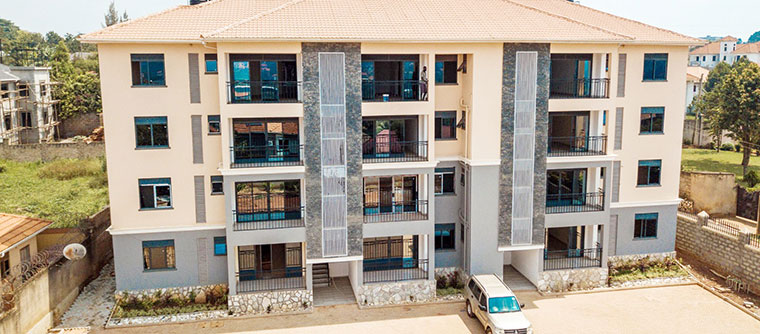Investment opportunities as result of flourishing condo economy
By Denis Jjuuko
If you still visit the branch of a commercial bank or frequent most of Kampala’s shopping malls where the ‘middle and upper’ classes go, you will be accosted by young people with brochures and flyers sitting beside a miniature physical model of a building. They are usually selling houses known as condominium units or condos.
Condominium houses is where several people own a small part of a major building especially one that is storied. Condos are becoming increasingly popular in Kampala. In areas like Najeera, Kiwatule or Naalya, a two-bedroom flat goes for about Shs240 million and approximately Shs300m for a three-bedroom one, way cheaper than if one was to buy land and build a stand-alone house in the same location. Condos share spaces such as compounds, car parking, security, garbage collection and such other utilities.
Previously, these condos were only in Bugoloobi, Bukoto or Wandegeya in Kampala but as Kampala expands, so have these housing units (though there are also commercial buildings on the same model). To attract customers, developers of condos look for prime locations near the main road.
Condos enable developers to easily sell these units than say if they looked for one buyer for the entire building. They also enable the developers to get funding from the buyer way before the completion of the project. Basically, they use a buyer’s money to complete the construction of the project.
But as condos become increasingly popular, they will open up the economy to more opportunities. One such opportunity is going to be in homes for the elderly. Already, many people are struggling to juggle work and looking after their aging parents and relatives. In some developed countries, there are businesses which look after the elderly either in specialized homes or by simply driving them to their doctors for their appointments as nobody gives employees days off to do this.
In Uganda, we largely live with our aging relatives (and even adult offspring). As condos develop, this will become increasingly difficult as most of these ‘flats’ on the market are really small and most of them without even elevators to enable people access houses on the top floors (authorities should think about the elderly and people with disabilities when granting building permits).
And in the case where a family has lost a relative, condos aren’t ideal for one to organize wakes or vigils. So more funeral homes will have to be built to cater for this. As Uganda’s population continues to grow, putting more pressures on land, the condo economy will necessitate the establishment of commercial cemeteries. Instead of owning acres of land dedicated to burying people, you will simply pay for space only enough for the grave of the deceased. There are already many landless people so this is a good option for them, to give their relatives decent burials (Ugandans love this).
We have started experiencing a cultural shift from weddings and introductions. Previously, a wedding was hosted at the groom’s parents’ home. Then we shifted to hotels. Parents living in condos will need space to organize introduction events, birthday parties and such other things. Many of Kampala’s poor socialites hire houses when they want to do kwanjula —houses that define the glamour lifestyle they are accustomed to but can’t afford to own. This will continue to be the case.
If you are looking for where to invest, such houses on at least an acre of land or so could be somewhere to put your money. Families instead of holding intimate Kukyala (pre-introduction ceremony) and kwanjula in hotels and public places, a spacious home can do it for them. They can take over the house for a few days, have their photos well aligned in the foyers and living rooms and give an impression of a home than in a hotel or a public garden.
Kampala already lacks open spaces for recreation. Where can one take kids to safely ride bicycles or sit and picnic? Unlike Bugoloobi, Bukoto and Wandegeya flats, the condos being built today are on small pieces of land which sometimes aren’t even sufficient for the residents’ car parking needs. Every open space is being turned into a small structure of sorts, many times ugly.
There is an increasing need for open spaces for people. This is why Lugogo Cricket Oval is soon changing name to Lugogo Music Oval or something like that. The stadium at Namboole had turned into a venue for mass prayers and music concerts. As condos flourish, so will more opportunities for those looking for investment opportunities.
The writer is a communication and visibility consultant. djjuuko@gmail.com










